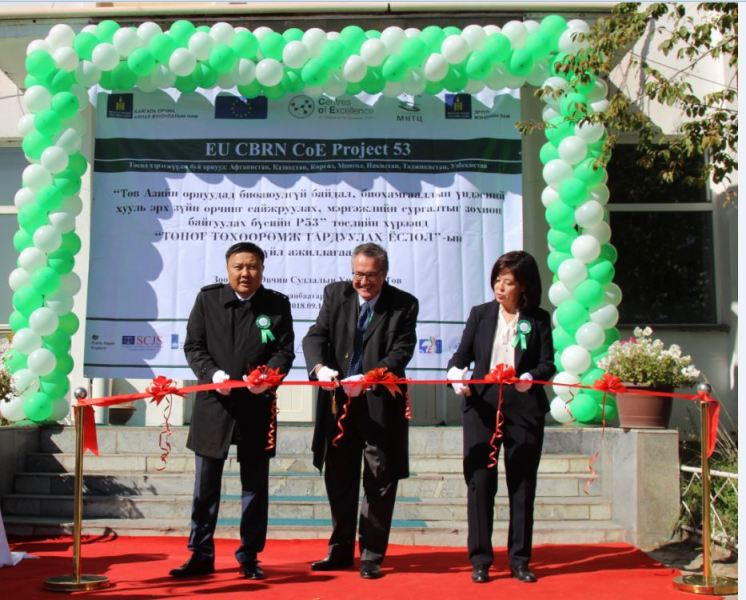Official ceremony for handover of laboratory equipment carried out by the EU funded Project 53 of the EU CBRN CoE Initiative

 Under the EU funded Project 53 (P53) of the EU Chemical Biological Radiological Nuclear and risk mitigation Centres of Excellence Initiative (EU CBRN CoE), a ceremony for the handover of laboratory equipment was conducted on 14 September 2018 in Ulaanbaatar, Mongolia. The ceremony was organized by Project 53 Implementation Unit in close cooperation with Ministry of Environment and Tourism of Mongolia.
Under the EU funded Project 53 (P53) of the EU Chemical Biological Radiological Nuclear and risk mitigation Centres of Excellence Initiative (EU CBRN CoE), a ceremony for the handover of laboratory equipment was conducted on 14 September 2018 in Ulaanbaatar, Mongolia. The ceremony was organized by Project 53 Implementation Unit in close cooperation with Ministry of Environment and Tourism of Mongolia.
In 2016 Mongolia became partner country of the EU CBRN CoE P53, which is titled ‘Strengthening the National Legal Framework and Provision of Specialized Training on Bio-Safety and Bio-Security in Central Asian Countries’. The awareness meeting of the P53 was followed with a numerous of biosafety and biosecurity trainings in Mongolia, as well as working group meetings of experts dedicated to legislative component of the project.
The handover of the laboratory equipment, which is purchased under the Project 53 for the Mongolian side took place at the National Center for Zoonotic Diseases. The event was inaugurated by Mr Namsrai TSERENBAT, Minister, Environment and Tourism, Head, National Biosafety Committee (NBC). The EU side was represented by Mr MARCO FERRI, Minister Counsellor of the European Union Delegation to Mongolia.
The ribbon cutting ceremony was attended as well by Ms Lamjav BYAMBASUREN, Vice Minister of Health, Ms Sandagdorj BAYARKHUU, General Secretary, National Biosafety Committee of Mongolia, Head, Members and Secretary of the NBC and representatives of the Institutions that will receive the equipment. The equipment handed over to the laboratories of the Mongolian institutions participating in the project includes Floor Standing Shaking Incubator, Cole-Parmer MPR 115 Advanced Centrifuge Bundle, Sonicator, Gradient Thermal Cycler, Biological Microscope, Stereo Microscope and Large and Mini gel tank, and its value is approximately 242 million Mongolian Tughrik.
The Project 53 was conceived and funded within the framework of the EU CBRN CoE (www.cbrn-coe.eu) initiative. The CoE currently covers 8 regions and 60 partner countries. The EU CBRN CoE Secretariat for Central Asia is based in Tashkent, Uzbekistan. It works in partnership with countries to encourage local ownership of CBRN action plans, policies and joint preparation of regional project proposals.
The ISTC, implementer of P53, has funded and managed several hundred projects in Central Asia over the past 20 years. Expertise to implement P53 is provided by a UK-led consortium of international legislative experts (SCJS, VERTIC), and bio-safety and bio-security training experts (PHE, RIVM).

